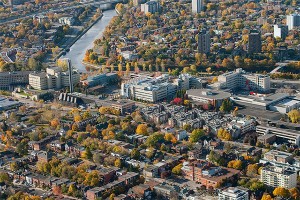University of Ottawa plans school of government

University of Ottawa. Photo: Jean-Phillippe Daigle, Creative Commons, some rights reserved
What comes to mind when you encounter the term “school of government”? Probably Harvard’s John F. Kennedy School of Government, though there are a fair number of similar graduate programs in the public-policy analysis field.
The University of Ottawa recently announced it plans to establish Canada’s first such school of government, beginning in 2014 (with student enrollment targeted for 2015). That institution is arguably an excellent fit for the role. It is the largest bi-lingual university in Canada and is located within walking distance of Parliament Hill and associated government buildings.
According to the university web biography, current president Alan Rock is a “is a three-time University of Ottawa alumnus having graduated from the University of Ottawa High School before completing a Baccalaureate in Arts in 1968 and a law degree in 1971”. Prior to becoming president in 2008, Rock was a prominent Liberal politician, first elected to parliament in 1993. He went on to be a cabinet mainstay whose portfolios included stints as Minister of Justice, Health, Industry and Infrastructure.
A decade ago, Rock was among the top contenders vying to replace Liberal Prime Minister Jean Chrétien, a role that eventually went to Paul Martin. Rock also served as Canada’s Ambassador to the UN from 2004-06. In short, he draws from a deep, broad background of government expertise.
The Ottawa Citizen wrote more about the proposed school in this article/interview from Aug 11. In it, Rock was asked how his own strong Liberal Party background could be kept neutral, so to speak:
Rock: “I guess it will be the kind of institution that the professors make it. I’m president of a university which is not a Liberal university nor a Conservative university. It is a university, and this is going to be a school of government.
“I fully expect the professors, when they gather in the school, will do just as they’re doing now in the faculties and departments, which is to pursue their academic interests, their teaching responsibilities, their research projects with an open mind. This is truly non-partisan, this university, and the school of government will be the same way.”
In a related angle, former federal budget officer Kevin Page now holds a 3-year post at the University of Ottawa as the Jean-Luc Pepin Research Chair on Canadian Government. The Ottawa Citizen reports Page hopes to establish a fiscal studies institute there too.
There’s continued interest among economists, planners and academia on ways higher ed does (or does not) stimulate local economies. The New York Times recently had an article on just that: “Colleges help Ithaca Thrive in a Region of Struggles” (8/4/13). Ottawa is already considered a “government town” in terms of economic activity and employment. Adding a school of government should contribute to that, though it may not do much to diversify the local landscape.
The University of Ottawa was also in the news this week over a far less-flattering situation: admissions to their school of journalism have been suspended for the coming academic year while the school is restructured. This comes in the wake of a “scathing” report that recommended the program be shut down or completely overhauled. (The university reportedly expects admissions will resume in 2014.) Meanwhile some existing students in the program are concerned about where this may leave them, in terms of education and reputation.
Tags: Alan Rock, canada, economy, education, School of government, school of journalism, University of Ottawa








One thing a School of Government should teach is the critical importance of a mandatory national Census – and the value of unbiased research (as opposed to ideology) as a tool for good governance.